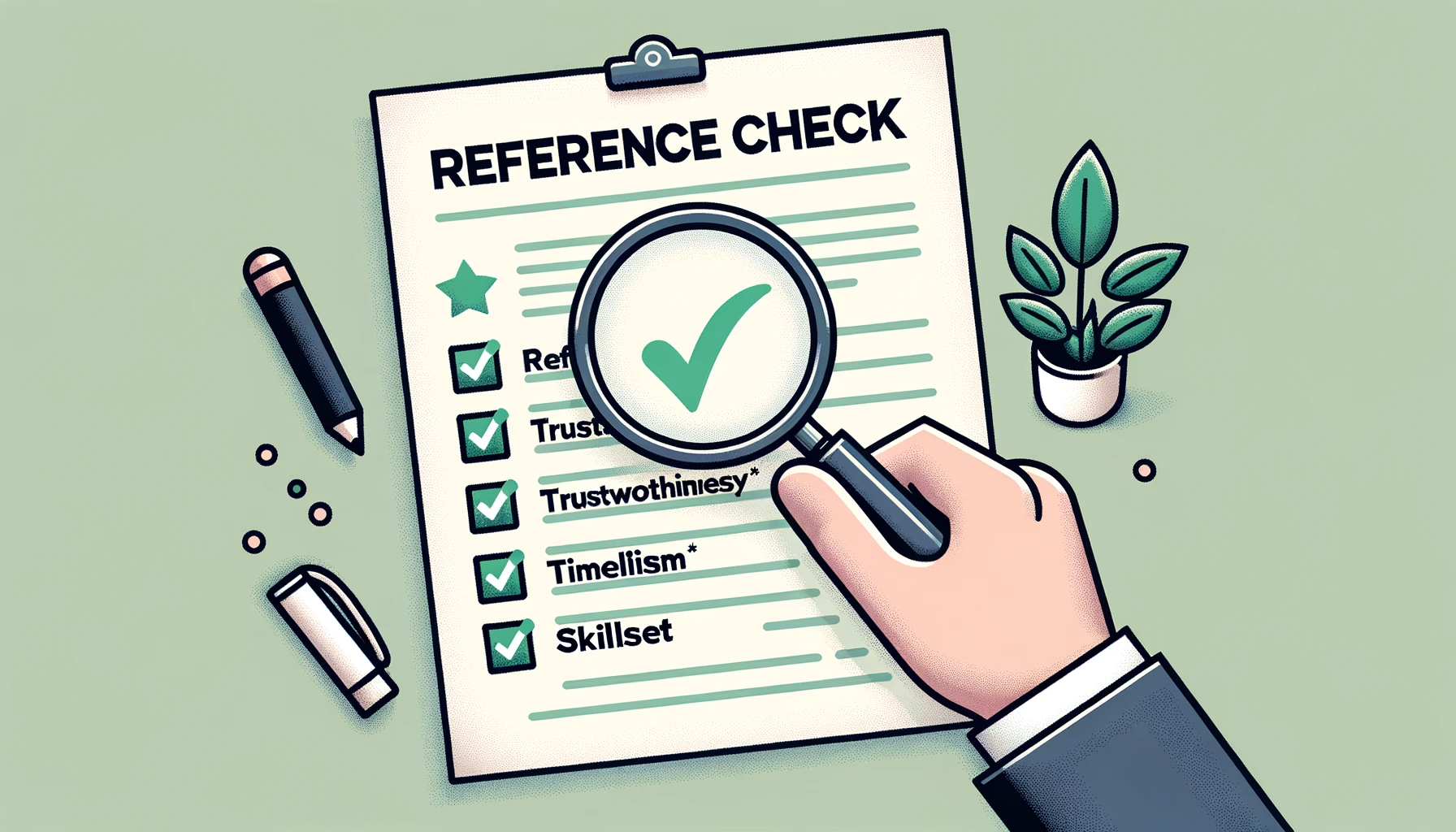Getting Reference Checks Right
Posted on 9 months ago
The significance of conducting reference checks in the hiring process is something almost every seasoned HR professional can attest to. Industry leaders such as Jack Altman, CEO and Co-founder of Lattice, don't just consider it important—they label it as an "underrated secret weapon" in recruiting. This sentiment is further supported by scholarly research, including publications from the Harvard Business Review.
The Complicated Reality of Reference Checks
As much as reference checks are valued for the unique and often indispensable insights they offer, the process is often cumbersome, time-consuming, and fraught with challenges. Let’s dive deeper into each of these common issues:
Time Drain
One of the biggest grievances hiring teams have is that reference checks are a logistical nightmare. The effort that goes into coordinating phone calls, playing phone tag, and waiting for people to be available can significantly slow down the entire hiring process.
Data Overload
Another common issue is the text-heavy nature of the data collected. Reading through paragraphs of comments and impressions can be overwhelming, especially when you're dealing with multiple candidates.
Underutilized Information
What adds to the frustration is that often, the rich data collected doesn’t get the attention it deserves post-collection. This valuable information frequently ends up gathering dust, so to speak.
Poor Timing
In many cases, reference checks are conducted too late in the game, rendering the insights ineffective in actually shaping the hiring decision.
Ineffectual Results
Despite the effort put into conducting them, reference checks rarely end up disqualifying candidates, which can make the entire process seem futile.
Positive Bias
It's a given that candidates will choose references they expect to be favorable, introducing an inherent positive bias into the process.
The Risk of Forgoing Reference Checks
Eliminating reference checks from the recruitment process may seem like a tempting solution to these challenges, but that's a perilous path. The first question to ask is: What is the opportunity cost of not conducting reference checks? The answer is potentially multi-faceted. You risk either missing out on a gem of a candidate or, conversely, hiring someone who ends up being a poor fit—both of which are costly mistakes.
Revamping the Reference Check Process
Given the inherent complexities and the significant stakes involved, it's imperative to find a way to make reference checks more efficient, more insightful, and overall, more effective. Here are some targeted strategies to address each of the issues previously outlined.
Tackling Time Constraints
The traditional method of scheduling phone calls for reference checks is outdated and cumbersome. A more contemporary approach could involve sending out pre-designed surveys focusing on the candidate’s behavioral traits. These surveys, backed by principles of industrial-organizational psychology, can yield deep insights in a fraction of the time. Experience shows that a well-designed survey can be completed by references within just one to two days, significantly accelerating the timeline.
Streamlining Data Consumption
Rather than relying on lengthy text-based feedback, why not employ visual data representation methods? You could create scorecards that indicate how a candidate fares on key metrics, or even lists that highlight a candidate’s primary strengths and weaknesses. Visual spectrums could indicate how well a candidate's working style aligns with the team they are being considered for. This approach makes it easier for hiring teams to quickly understand and act on the information gathered.
Maximizing the Utility of Collected Data
Data collected from references should not be a one-and-done affair. Uploading this data to the Applicant Tracking System (ATS) ensures that it's readily accessible for future use. Moreover, this data can be invaluable in the onboarding process, helping managers to tailor their approach to each new hire, thereby expediting the onboarding process and increasing employee engagement from day one.
Revising the Timing
By making the process more efficient, there's room to conduct reference checks earlier in the hiring timeline. This ensures that the insights can be acted upon effectively, rather than being an afterthought. Companies like Zapier have successfully integrated references with final round interviews, allowing for a more holistic view of candidates before making a hiring decision.
Making It Count
If reference checks are merely rubber-stamping the decisions of the hiring committee, then they are a wasted effort. The data gathered should be robust enough to sometimes cause the committee to reconsider their initial impressions. Anecdotal evidence suggests that high-quality reference checks have led to hiring decisions that might not have been made otherwise, with these hires often turning into top performers.
Addressing the Bias Issue
While it's true that candidates will generally select references who are likely to give positive feedback, it doesn't mean that the data will be entirely skewed. Analytical methods can be employed to weigh the feedback based on various factors such as the reference's experience level, the duration of their relationship with the candidate, and the time elapsed since they last worked together. This adds nuance to the assessment and helps mitigate inherent biases.
Instituting Standardization
The use of pre-designed surveys not only speeds up the process but also adds a much-needed layer of standardization. This ensures that each candidate is assessed based on the same criteria, making it easier to compare and contrast different applicants. Software tools can further assist in specifying the number and types of references required, adding another layer of uniformity to the process.
Conclusion: Harnessing the Full Potential of Reference Checks
By systematically addressing these challenges, organizations can fully capitalize on the untapped power of reference checks. This is particularly crucial in today's competitive job market, where speed and efficiency are of the essence. The long-term benefits extend beyond immediate hiring needs, impacting areas like talent branding, job description formulation, and structured interviewing. In slower hiring markets, a well-calibrated reference check process can serve as a bulwark against indecision, helping organizations to confidently identify and secure the best talent available.
By embracing these changes, companies can turn the often-dreaded task of conducting reference checks into a strategic asset, one that pays dividends in both the short-term hiring process and long-term organizational success.
Posted in Jobs
After Affirmative Action: A New Era of College Admissions
Posted on 1 year ago
In the wake of the Supreme Court's recent decision to strike down Affirmative Action's racial and ethnic preferences in college admissions, prestigious universities across the United States are grappling with a new challenge. With the phasing out of objective criteria such as standardized testing and race, these institutions are now overwhelmed with applicants and are seeking innovative ways to identify top-tier students.
The Supreme Court's ruling has necessitated a shift in the admissions process, marking the end of an era where Affirmative Action played a significant role in shaping the student body. This decision has sparked a renewed focus on subjective criteria, with universities increasingly emphasizing personal qualities and experiences. The question now is: how can universities effectively identify the students who are academically capable, diverse, and truly passionate about their institution?
One answer lies in the power of high-quality references from educators and community leaders. These references can provide a unique insight into a student's character, work ethic, and commitment to their community. They can attest to a student's passion for learning, their resilience in the face of challenges, and their potential to contribute positively to the university community. In essence, these references can paint a vivid picture of a student that goes beyond grades and test scores.
Moreover, university-targeted application essays are becoming increasingly important. These essays allow students to express their specific interest in a university, demonstrating their understanding of the institution's values and culture, and articulating how they envision contributing to the university community. This personalized approach helps universities identify students who are genuinely passionate about their institution, rather than those who are simply applying to multiple prestigious universities in the hope of being accepted by one.
SafeHire allows students to apply to universities with university-targeted e-portfolios, including video pitches and validated testimonials from educators and community leaders. While essays can provide valuable insights, they may not fully capture a student's passion, and there's a growing awareness among admissions offices that AI like ChatGPT often contributes to their creation.
In contrast, a video pitch offers a more authentic platform to students to express their enthusiasm and share their story with greater impact. This gives admissions officers a more holistic view of the applicant, helping them to identify students who are truly passionate about their institution.
Meanwhile, the validated testimonials provide a reliable and efficient way for universities to evaluate references. Educators and community leaders can upload their testimonials directly to the platform, where they are verified for authenticity. This not only saves time for admissions officers but also ensures that the references are trustworthy and relevant.
In conclusion, the recent changes in college admissions have created new challenges for universities, but they have also opened up new opportunities. By focusing on personal qualities and passion, universities can identify students who are genuinely interested in their institution and who have the potential to make a positive contribution to the university community. With SafeHire, this process can be made more efficient and effective, benefiting both universities and students.
Posted in Jobs
The Long-Term Impact of Your First Salary
Posted on 1 year ago
As new graduates embark on their professional journeys, choosing the first job out of college becomes a momentous decision. This choice is about more than just launching a career; it significantly impacts their future earnings trajectory.
An enlightening study in the Journal of Labor Economics (2011) emphasizes this point, revealing that higher initial wages can often lead to higher wages later in life. This research underscores the lasting impact of your first salary and why graduates should carefully evaluate their initial job offers.
Initial Salaries: A Springboard for Future Earnings
The study shows that your first salary doesn't merely serve as the starting point of your income journey; it sets a benchmark for future salaries. Each increase in your initial salary compounds over the years, paving the way for a substantially higher lifetime income.
Here's why: when you negotiate your salary for future roles, your past earnings often form the baseline for discussions. Therefore, a higher starting salary acts as a stepping-stone, leading to potentially higher wage increments throughout your career.
Signaling Value in the Job Market
Beyond its impact on earnings, your initial salary serves as a market signal of your worth. Future employers often use past earnings to gauge your value and potential, meaning a higher starting salary could position you as a high-demand candidate in future job considerations. This perception can open doors to more lucrative opportunities, thereby further enhancing your earning potential.
Confidence, Job Satisfaction, and Performance
The influence of the initial salary also extends to aspects like job satisfaction and self-confidence. The study suggests that employees who feel adequately compensated from the outset typically report higher job satisfaction. This satisfaction can boost work performance and productivity, leading to faster career progression and higher income over time.
Moreover, a strong starting salary reinforces your belief in your professional capabilities. The confidence stemming from this perceived value can be instrumental in driving ambitious career moves and negotiations, further impacting earnings.
Negotiation: The Often-Overlooked Skill
This research highlights the importance of effective salary negotiation at the start of one's career. Negotiating a better starting salary not only provides immediate financial gains but also sets a precedent for future salary negotiations. By honing negotiation skills early, graduates can influence their long-term income trajectory significantly.
Balancing Salary with Other Considerations
While the study emphasizes the impact of the initial salary, it's crucial not to overlook other factors in choosing a first job. Graduates should consider the complete job offer package, including non-monetary benefits, work-life balance, company culture, career growth opportunities, and learning potential.
The first job should ideally align with one's long-term career aspirations, contributing to overall professional development beyond just immediate monetary compensation.
Concluding Thoughts: The Weight of the First Salary
The study in the Journal of Labor Economics presents compelling evidence that the first salary plays a pivotal role in determining future earnings. As such, new graduates should approach their first job selection with a long-term perspective.
Rather than hastily accepting the first job offer, take time to understand the implications of the initial salary, negotiate effectively, and make an informed decision. Remember, your first salary sets the pace for your future earnings. Choose wisely, as this decision can significantly influence your career trajectory and financial growth.
Posted in Jobs
Assessing your NACE Core Competencies
Posted on 1 year ago
Navigating today's complex job market requires more than just a degree; it demands a unique blend of skills, knowledge, and experiences. This is where the National Association of Colleges and Employers (NACE) Core Competencies come into play, serving as a critical bridge between the academic world and the workplace.
Our platform aims to connect these competencies with the job market's demands. For this purpose, we have tailored a set of skill assessments that align with the NACE Core Competencies, supporting job seekers in demonstrating their career readiness.
Communication
NACE's Communication competency emphasizes the importance of articulating thoughts and understanding others' perspectives. Our Active Listening and Written Communication assessments are designed to capture these essential aspects.
Active Listening is about engaging and understanding, even when there are distractions. This skill enables effective teamwork, reduces misunderstandings, and nurtures strong professional relationships. It's a valued skill in fostering a cooperative and efficient work environment.
Written Communication, measured in our assessments through English grammar and punctuation, ensures clarity and professionalism in conveying thoughts and ideas. Correct grammar and punctuation are vital in reducing ambiguity and avoiding miscommunications that can lead to inefficiencies.
Together, these assessments provide a snapshot of a job seeker's communication skills, underscoring their readiness to contribute effectively in a dynamic and diverse workplace.
Professionalism
The Attention to Detail assessment on our platform resonates with the NACE's Professionalism/Work Ethic competency. This competency isn't just about punctuality and productivity but also about the quality of work, a significant aspect of which is attention to detail. Our assessment helps job seekers highlight this often-overlooked skill that plays a vital role in minimizing errors and enhancing the overall efficiency of operations in the workplace.
You can also display your professionalism by using your SafeHire profile to send employers targeted video pitches. Before recording your pitch make sure you clean your background, wear professional clothing, and set your camera to eye-level.
Critical Thinking
The NACE's Critical Thinking/Problem Solving competency is fundamental in today's evolving work landscape. Our related assessments, Problem Solving and Logical Reasoning, allow job seekers to emphasize these essential skills.
Our Logical Reasoning assessment scrutinizes a user's ability to analyze statements and arguments, and deduce valid conclusions. It gauges proficiency in deductive and abstract reasoning, reflecting how well a user can apply general principles to specific scenarios.
The Problem Solving assessment focuses on strategic decision-making. It presents users with real-world-like problems, testing their ability to analyze varied information, evaluate potential outcomes, and decide on the most effective course of action.
Together, these assessments offer a robust measure of a job seeker's critical thinking skills, confirming their readiness to handle the challenges of the modern workplace effectively. These tools bridge the gap between job seekers' potential and employers' needs, promoting a more efficient and dynamic professional ecosystem.
Technology
In today's digital-centric work environment, Typing Speed, while not a direct NACE competency, is fundamental. The ability to type quickly impacts productivity as professional communication largely occurs via digital channels.
Fast, accurate typing leads to efficient email responses, quicker note-taking, and real-time communication during digital meetings. It saves time and allows professionals to focus more on the task at hand, whether it's formulating responses or brainstorming ideas, rather than on typing itself.
In roles such as administrative, customer service, or data entry, high typing speed is a critical competency. Thus, our Typing Speed assessment is not just a measure of a mechanical skill, but reflects a job seeker's readiness for a fast-paced, digital-first work environment. It enables job seekers to demonstrate their digital proficiency and efficiency, essential attributes in today's professional landscape.
Equity & Inclusion
As our workplaces become increasingly global, the NACE's Global/Intercultural Fluency competency takes on added significance. Our Spanish and Mandarin Comprehension assessments are designed to tap into this aspect, amplifying the value of multilingualism in fostering a more inclusive work environment.
Understanding languages like Spanish and Mandarin, two of the most widely spoken languages worldwide, is not just about communicating effectively with a larger demographic. It's about appreciating and respecting the rich tapestry of diverse cultures, races, and experiences that constitute our global community. By comprehending these languages, professionals can break down barriers, facilitate better understanding, and build stronger, more inclusive relationships with colleagues and clients from different cultural backgrounds.
In essence, these language comprehension assessments aren't merely a demonstration of linguistic proficiency. They are a testament to a job seeker's global fluency and intercultural understanding, crucial factors that contribute to a more inclusive, respectful, and effective workplace. They show an openness to learning from diverse cultures and experiences, and an ability to adapt to varying perspectives, a significant advantage in our interconnected world.
Show Your Career Readiness
Our skill assessments are not just about quantifying abilities; they are designed to provide a holistic view of an individual's capabilities and readiness for the professional world. They provide job seekers with a way to demonstrate the value they bring to potential employers, equipping them with the confidence to venture into the job market and make their mark. Remember, your skills are your strengths. Let's assess, enhance, and showcase them together.
Click here to learn more about SafeHire assessments and find example questions.
Posted in Jobs
3 Most Important Traits to Show in Video Interviews
Posted on 1 year ago
In today's highly competitive job market, standing out from the crowd is essential. With an increasing number of companies utilizing video interviews as part of their recruitment process, it's crucial for job seekers to demonstrate professionalism, confidence, and enthusiasm throughout these interactions. These traits not only create a lasting impression but also significantly increase the likelihood of being considered for the position.
Professionalism is a key attribute that employers seek in prospective candidates. It sets the tone for the entire interview and reflects an individual's commitment to the role. In a video interview, professionalism is displayed through appropriate attire, a tidy and distraction-free environment, and ensuring the technology functions smoothly. These measures signal to the interviewer that the candidate takes the opportunity seriously and is prepared to meet the expectations of the job.
Confidence is equally vital during a video interview. A self-assured candidate will speak clearly, maintain eye contact through the camera, and express their thoughts and qualifications effectively. Demonstrating confidence in one's abilities and experiences assures the interviewer that the candidate is capable of handling the responsibilities associated with the role.
Maintaining a enthusiasm throughout the video interview is equally crucial. A positive demeanor showcases an individual's ability to stay optimistic and focused when facing challenges. By exuding positivity, a candidate can leave a lasting impression and set themselves apart from other applicants.
To make a truly memorable impact, job seekers should consider incorporating an upfront video pitch into their application process. This innovative approach allows candidates to showcase their professionalism, confidence, and positivity right from the start. By creating a brief, engaging video, applicants can provide a glimpse into their personality, skills, and what makes them a great fit for the role.
In the video pitch, applicants should succinctly introduce themselves, highlight their relevant experiences, and explain why they are interested in the position. It's important to maintain the same level of professionalism, confidence, and positivity displayed during the video interview. A well-crafted video pitch can help job seekers stand out among a sea of resumes and catch the attention of hiring managers.
In conclusion, displaying professionalism, confidence, and positivity during video job interviews is essential for leaving a lasting impression on potential employers. By adopting an upfront video pitch in their application process, job seekers can further differentiate themselves and demonstrate their unique qualities from the very beginning. As the job market continues to evolve, mastering these skills and embracing innovative approaches will undoubtedly increase the chances of landing that coveted position.
Posted in Jobs
You Should Meet with a Career Advisor
Posted on 1 year ago
The benefits of a quality education don’t end in the classroom. Strong higher-ed institutions are eager to help you launch your career with impact.
Finding a quality job isn’t as simple as having the right skills, and job hunts have become anything but intuitive. You're likely competing against hundreds of other applicants with similar qualifications and work experience. Presentation is everything, and that's where your career service team steps in.
Only once in your life you have a team fully dedicated to your career success. From landing internships, writing cover letters, job interview prep, and more, students who leverage their college’s career services gain a substantial advantage.
Before meeting with your career services team, you simply don't know what you don't know. What may strike you as a perfectly compelling cover letter may show obvious flaws to an experienced career advisor. You may have crafted the perfect "objective statement" on your resume, only to have your career advisor tell you these statements appear self-serving and are outdated. This is why approaching your job search alone is a bad idea.
Crafting a powerful application is more than merely avoiding grammatical and punctuation errors. Career advisors can help you humanize and strengthen your application, boosting your chances of landing quality interviews.
You are more than your resume. You just need to show it.
Posted in Jobs
Land More Interviews with Social Proof
Posted on 1 year ago
It’s never been harder to stand out and land interviews. The ability to apply with a single click allows some jobseekers to spam their resume to hundreds of employers. In 2015, Glassdoor estimated 250 applications for the average job opening.
Hiring managers wade through countless nearly identical resumes, looking for standout applicants. To their chagrin, jobseekers pack their resumes with “action verbs,” lengthy work history descriptions, and claims of excellence.
And why should the hiring manager believe what Joe Schmoe claims about his skills? Because Joe said so.
The best jobseekers lose interviews to those who are better at “tooting their own horn.” Self-boasting is beating merit.
Take an example: Candace, as college Senior, completed business internships during her Sophomore and Junior years. Her managers at both companies described her as "the best intern they'd ever had." Now Candace is trying to get an interview with her three dream employers. Does being the best intern ever help her get that 1st interview?
Nope. How would those three dream employers know she was the best intern ever? Her resume looks exactly the same as everyone else's: A few bullet points about her internship, such as what she did, what she learned, and skills she used. Her internship experience on her resume will look identical to that of the average intern, and the worst intern. Candace has to hope to get the 1st interview, then pass 2-3 more, before those employers even consider contacting her references.
Recruiters simply can't contact everyone's references. Reference checks require a lot of time, phone tag, and frustration. That's why they wait until the end of the hiring process before maybe contacting references.
They'd love to have high-quality references; that’s why internal references drive so much hiring. They just can’t spend hours trying to contact references.
As a pro-active jobseeker, this is a problem you can solve and be rewarded for.
By applying with upfront, validated testimonials from quality sources, you can stand out immediately as the most credible candidate. SafeHire makes it easy to gather & apply anywhere with video/written testimonials from educators, internships, and past employers. Just link your SafeHire URL in your resume’s contact info section. While you're at it, use your profile to make a targeted 30-second video pitch for each of your top employer choices.
The best way to stand out and land quality interviews is by problem-solving for hiring managers. Why leave it up to chance for hiring managers to find out your past superiors thought you were exceptional?
Posted in Jobs
The Issue with LinkedIn Recommendations
Posted on 1 year ago
LinkedIn is the world’s go-to professional networking platform. Their efforts have generated 700 million users and countless opportunities. However, a pure focus on networking has come with a few tradeoffs.
LinkedIn endorsements and recommendations as networking features, not to give recruiters confidence in your value. These features are built for reciprocation- friends, family, and work acquaintances give endorsements & recommendations, expecting to receive one back. This creates too much complexity for employers to find useful, especially when they cannot even contact recommendation providers without paying for InMail messages or sending a connection request. SafeHire’s founder (my wife), Karli, effortlessly stacked up LinkedIn endorsements for “Hostage Negotiation,” despite precisely zero experience. Because why not?
Those most qualified to give credible recommendations, such as employers & educators, face hazards for providing LinkedIn recommendations. Each user's profile shows the recommendations they've given, leading their other connections to feel entitled to an equally complimentary recommendation. For employers & educators, it’s safer not to give any recommendations than to become obligated with continual requests and expectations.
SafeHire solves references for hiring managers, jobseekers, and reference providers, focusing on verification, not networking. References may only come from workplace superiors, HR officers, and educators, using their verified professional email addresses. Reference-providers can know their references will only be visible to employers with access to an applicant’s custom URL. Each reference contains the provider’s professional email address, verifying their identity and allowing employers to quickly confirm their sincerity.
With SafeHire, providers can write a reference or even easily record a 30-45 second reference video. And let me tell you, recruiters love the added sincerity of a reference video.
In summary, LinkedIn will serve as a great networking resource, while SafeHire is the best way to share compelling, upfront references with employers and land interviews.
Posted in Jobs
The Power of Concise Credibility
Posted on 1 year ago
Most people have no problem talking extensively about their work, often in detail far exceeding their audience’s interest. It’s natural for our experiences and responsibilities to seem far more interesting to us than they do to others.
This propensity to overshare can become dangerous when fitting one’s entire professional profile onto a single-page resume. Many jobseekers assume they should squeeze as many details, action verbs, and power phrases into their self-presentation as possible.
This is where applying with empathy comes into play. A hiring manager with 250 resumes to review just isn’t that interested in detailed lists of your many duties. The best way to stand out is by concisely showing your unique value and credibility.
Start your resume by linking your experiences and qualifications to those listed in the job description. A detail-dense resume only makes it harder for hiring managers to find those important links. Even worse, the utility of less relevant information quickly turns from diminishing returns into negative returns as hiring managers become more likely to skip a dense resume.
Instead of adding density with claims of self-excellence and unsubstantiated skills, why not stand out and establish credibility by letting others do the bragging for you? With your free SafeHire profile, you can begin gathering compelling, validated testimonials from educators & employers. Just link your SafeHire URL in your resume’s contact info section to quickly catch hiring managers’ attention and start landing quality interviews.
Posted in Jobs
Sell Your Services
Posted on 1 year ago
Like it or not, selling is non-optional. When you apply for a job, you sell your services to a customer (the hiring manager). Hiring you is an incredibly important (and expensive) decision for the customer. Fortunately, you happen to be the world’s foremost expert on your services.
This isn’t cold sales. An open job means there is a recognized problem requiring a solution. It’s your responsibility to fully understand the employer’s need in order to present yourself as the perfect solution. You likely even have a job description to work with.
Start by matching your services and capabilities to the job description; the employer shouldn’t have to think very hard to see how you as the perfect fit.
Next, do something to grab the employer’s attention. When you and I shop for a product or service, we may look at 3-5 options. Compare that to the average job opening, wherein a hiring manager is likely to receive around 250 competing applications. The right qualifications and credentials aren't enough. You have to set yourself apart from the competition.
Many applicants mistakenly attempt to stand out visually with something like a unique resume format, which only adds hassle for the hiring manager. The key is to differentiate yourself in a way that adds value or eliminates hassle.
What do you look for when making important purchasing decisions? My wife and I always use Google reviews before eating at a restaurant and Rotten Tomatoes before watching a movie.
Would you make an expensive purchase from a company that wasn’t eager to share customer testimonials? Would you buy an expensive product with bold claims but that didn’t make evidence readily available for customers? Probably not.
As customers, we expect credible sellers to eagerly provide evidence, not just claims. Hiring managers know that most resumes contain just as many embellishments as online dating profiles, making credible candidates the best candidates.
You can become the most credible candidate by applying with validated written/video testimonials from your past employers and educators. If you have achievements to be proud of, you can do better than hoping potential employers will take your resume claims on faith. With your SafeHire profile, you can easily provide employers with upfront, compelling testimonials and evidence of your achievements. Simply link your custom SafeHire URL in the contact information section of your resume.
Best of all, you can get started by creating your free profile today.
Posted in Jobs









